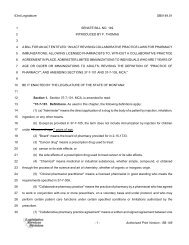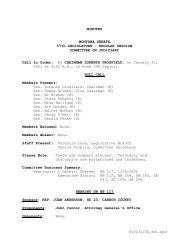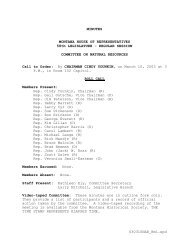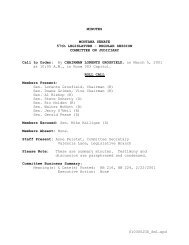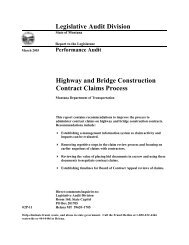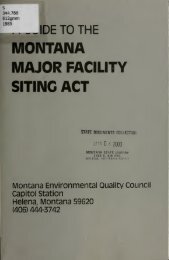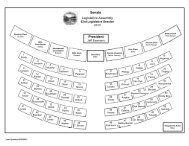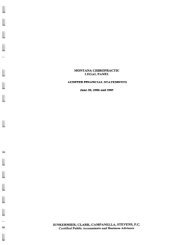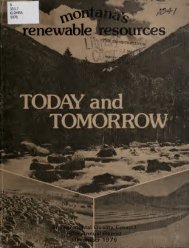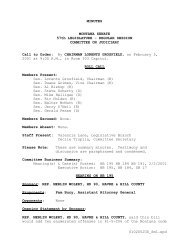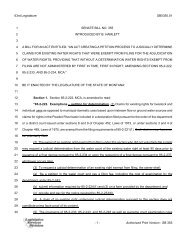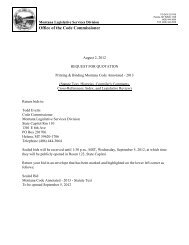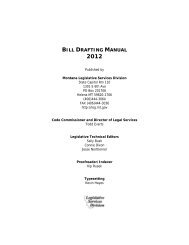Public Comment. Volume III - Montana Legislature
Public Comment. Volume III - Montana Legislature
Public Comment. Volume III - Montana Legislature
Create successful ePaper yourself
Turn your PDF publications into a flip-book with our unique Google optimized e-Paper software.
per landowner and a price that they would be willing to pay for core holes and excavated test pits. In a<br />
series of meetings and an exchange of letters with various agents and principals of the TRR we pointed<br />
out that a flat fee of $1000 for accesss neglected to consider the varying amounts of land that the railroad<br />
wished to access. and that it seemed that the access fee should be variable. dependent upon how much<br />
access and for how long a period of time should be t'aken into account. We were informed that the TRR<br />
would not even consider moving away from their "one size (or payment) fits all" position. The TRR was<br />
also adamant that it would be "unfair to all landowners" if they negotiated the core hole or test pit price<br />
that they had offered. There was always the constant and almost gleeful threat of condemnation lurking<br />
in the background in any dealings with railroad agents.<br />
There are other areas in which the landowners have been rebuffed. Those of us who own, lease,<br />
and work the lands that mill be affected by the TRR have a special insight into some areas of concern that<br />
are admittedly, in some cases, nonprofessional but on the other hand, likely to be overlooked in the<br />
preparation of mitigation requirements. We have not been consulted, or interviewed on areas of historic,<br />
or cultural concern. Our attempts to explain and therefore ease animal-both domestic and wildmovements<br />
across the ROW have been ignored in the name of "economic considerations" for the railroad<br />
Let me give you an example of this: Rosebud County had a road that crosses a state section that we lease.<br />
The road was situated above a high cut bank along Tongue River that was constantly eroding and<br />
threatened the road. There were a couple of options available to the county. One was to riprap the bank<br />
of the river to prevent further erosion; the second, and the one chosen, was to relocate the road further<br />
away from the river. There was a road bridge on the road to handle the moff from floods on a side creek,<br />
Roe and Cooper. The county commissioners were aware that a flood in July of 1958 washed out a smaller<br />
bridge, so that they increased the size of the replacement bridge. Our ranch also used the bridge for a<br />
cattle pass from our swnmer pasture to the river, and the commissioners replaced the bridge with another<br />
even larger one. The configuration of the TRR ROW will require that the road be moved once again<br />
placing the road closer to the river. The county or the Department of Transportation will be expected to<br />
bear the cost of moving the mad, I assume, and I will be forced to negotiate with the DOT, or some state<br />
agency that the existing bridge be replaced with another new bridge. I have less faith in a culvert<br />
handling the amount of water that has historically come down Roe & Cooper Creek; I doubt that our<br />
cattle, or deer, or antelope or any other wild animals will as willingly enter a long, dark culvert to get<br />
access to the river for water. I have no way to negotiate with the TRR for the bridge especially since I<br />
don't even own the land where one is required. But is the Department of Fish, Wildlife and Parks aware<br />
of how important that bridge is to the operation of this ranch, or to the safe movement of the public's<br />
wildlife? A plea for sterilized ballast on the entire route to prevent weed invasions has fallen on deaf ears.<br />
Even if'individual ranchers were successful in somehow getting a concession for sterile ballast on their<br />
properties, the effort would be futile if their neighbors were unconcerned, or unsuccessll in the<br />
negotiation process.<br />
This letter has been much longer than I intended, but I hope that it has illustrated the frustration<br />
that one affected landowner along the proposed TRR ROW has experienced over the twenty years. We<br />
landowners are not only powerless, but have been ignored during this whole sorry process. I would plead<br />
with the State Legislators or State Departments that have any influence in getting stringent, consistent and<br />
meaningful legislation and mitigation measures as a requirement for the construction and operation of the<br />
Tongue River Railroad.<br />
Sincerely,<br />
EQC Eminent Domain Study -145-



